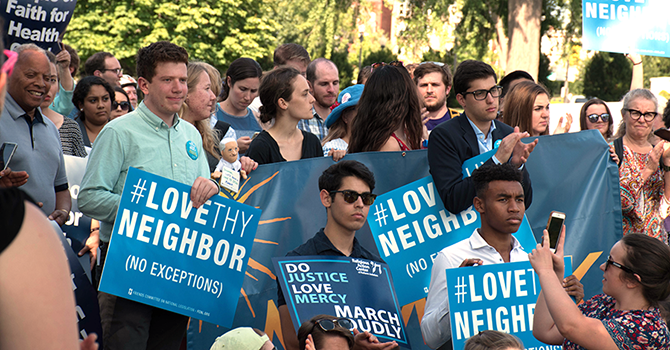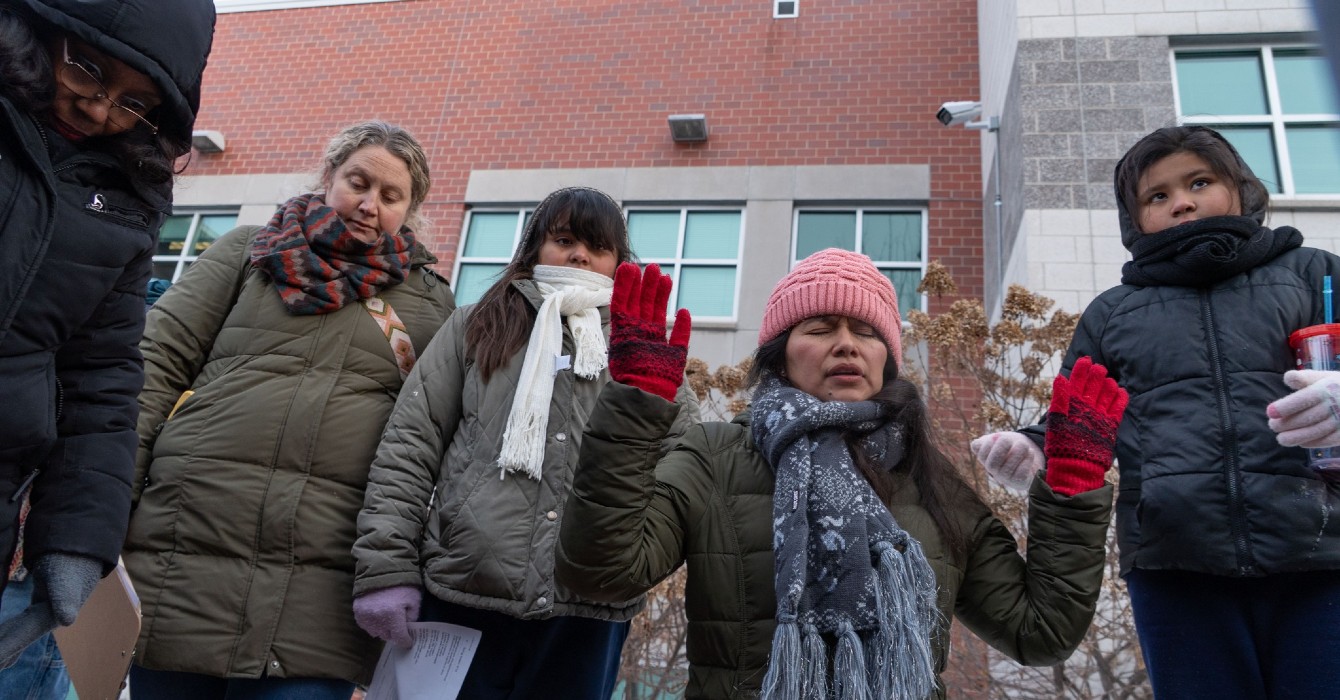On the Tuesday before Easter, several dozen lobbyists based in Washington, D.C., and another 200-plus concerned citizens from across the nation gathered via Zoom to discuss the only thing that seemed to matter anymore: COVID-19.
A month earlier, the World Health Organization had declared the spread of the disease caused by the novel coronavirus a full-blown pandemic. Two weeks later, after the requisite partisan gnashing of teeth, lawmakers on Capitol Hill had approved the largest economic stimulus package in U.S. history to help cope with the fallout.
The $2 trillion Coronavirus Aid, Relief and Economic Security Act, or CARES Act, allocated funding to bolster medical facilities, keep industries afloat, expand unemployment insurance and provide one-time stimulus checks to taxpayers.
But for the faith-based advocates on this Zoom call, the bill didn’t go far enough in addressing the needs of the most vulnerable: families relying on food stamps and rental assistance, incarcerated populations, asylum seekers fleeing violence and persecution, front-line health care workers and tribal communities.
“Listen in,” said Sister Simone Campbell, the executive director of Network Lobby for Catholic Social Justice, at the start of the webinar -- “and then put your representative’s number on speed dial.”
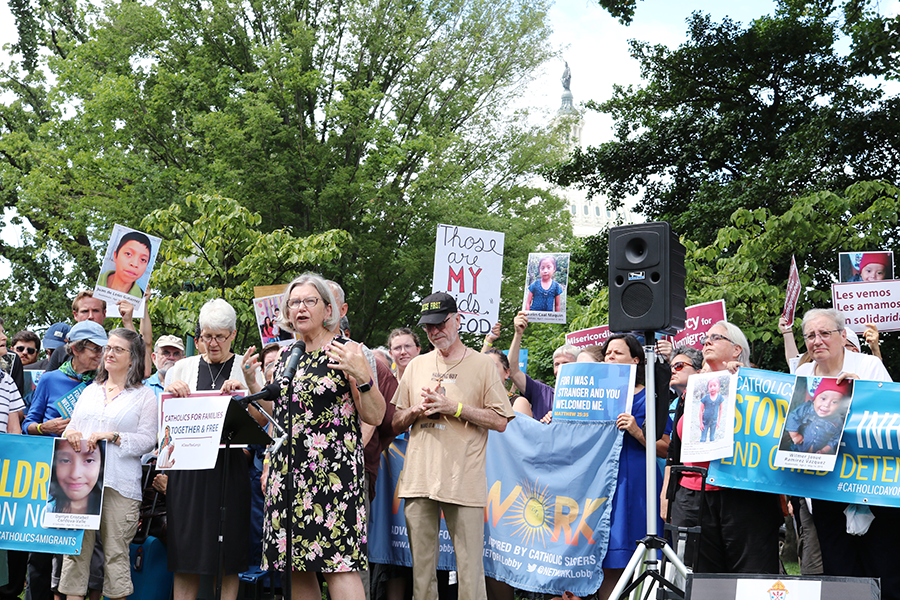
The call was sponsored by the Washington Interfaith Staff Community (WISC), a network of staff from more than 70 national religious bodies and faith-based organizations, like Campbell’s, with offices in the nation’s capital. In addition to supporting grassroots efforts, participant organizations lobby at the national and international levels for policies important to their constituents -- something they also undertake collectively through WISC.
Staff from the WISC partner organizations are sorted into working groups that address a variety of critical issues, from hunger and housing to health care and racial justice.
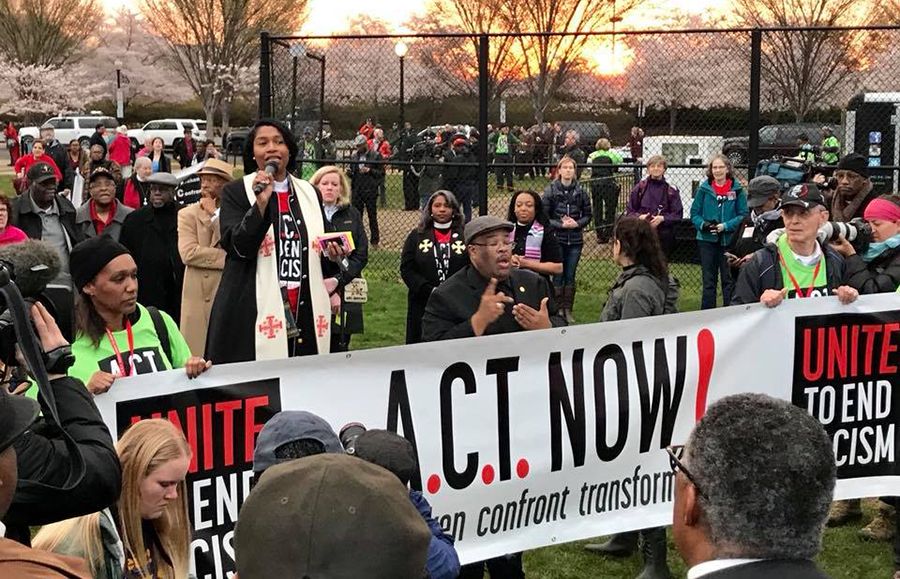
Weighing the moral implications
Though the working groups tend to meet separately, weighing the moral implications of everything from defense spending to the tax code, COVID-19 created what one participant called an “all-hands-on-deck moment,” exposing even more starkly the gaps in the social safety net that disproportionately affect marginalized populations across a broad range of issue areas.
Seated in front of laptops at kitchen tables and hastily constructed home workspaces, representatives from several of those groups outlined the items they would ask Congress to include in the next relief bill: expanded benefits for those enrolled in the Supplemental Nutrition Assistance Program, or SNAP; more money for victim services programs for indigenous women, who may be trapped at home with their abusers; free coronavirus testing and treatment for all, regardless of insurance or immigration status; and more transparency from correctional facilities on how they’re handling the virus.
What are your top priorities in “taking care of [your] people”? What is the “place of passion” from which you and your church or organization can speak with your representatives on these issues?
Before closing with a prayer, the hourlong call included a short lesson on how those outside the Beltway could effectively lobby their representatives from afar. Pick one or two of these priorities and speak about them “from your place of passion,” said John B. Johnson, the program director for domestic policy in the Advocacy Office of the Evangelical Lutheran Church in America.
Set a positive tone and clearly explain why that issue is important to you, said Shoshana Abrams, the advocacy teams manager with the Friends Committee on National Legislation, a nonpartisan Quaker lobbying group. Be persistent, she said. “And most importantly, be kind.”
While the political atmosphere in Washington has become increasingly polarized, faith-based advocates say they steer clear of the partisan rhetoric and personal attacks that characterize much of life on Capitol Hill. Their specific legislative priorities may differ, but the common denominator is generally the same.
If you are already engaged in advocacy, how might you think about being both persistent and kind in these efforts?
“We tend to frame things as ‘for the sake of the people,’” said Campbell, who co-chairs the WISC working group comprising the executives of all the member religious organizations. “The issues are not about the political win. It’s about taking care of our people.”
That doesn’t mean they collectively agree on every piece of legislation, but they make it a point to find the places where they do agree and then lobby collaboratively on both sides of the aisle. It helps, several said, not to think of policies as Republican or Democratic, conservative or liberal, but rather to approach each from a moral standpoint: How does this legislation impact “the least of these”?
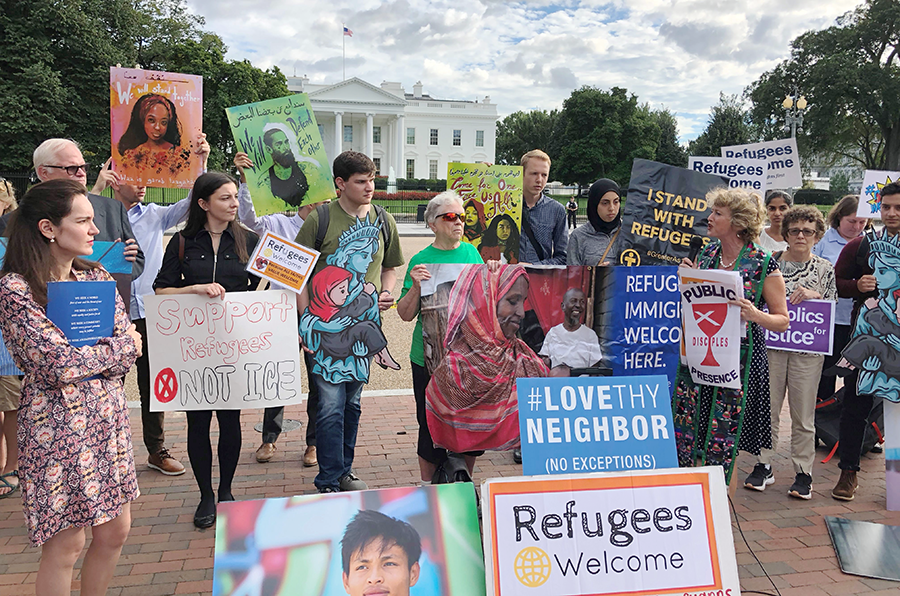
“We may be of different faiths, but where we meet is in the Constitution, and the Constitution is the best of our civic and moral responsibility. It’s all about, ‘We the people …, in order to form a more perfect union, establish justice, insure domestic tranquility …’ It’s all right there in the preamble,” Campbell said. “We bring our traditions, our Scriptures, our teachings to it, and it becomes this beautiful mosaic.”
With whom do you typically disagree on advocacy issues? How might you come together and find the places where you do agree, in order to strengthen your work for “the least of these”?
WISC isn’t the only collective of faith-based advocates in the nation’s capital, but it’s certainly one of the largest and longest running, with roots stretching back to the civil rights movement of the 1960s.
Its member organizations, encompassing Christian, Jewish, Muslim, Buddhist, Hindu and Humanist faith communities, routinely examine U.S. government policies through what one member calls the “justice lens” before deciding which ones they’ll tackle as a team. The heavy lifting is generally done within individual working groups, with member organizations looking to Scripture and their own religious doctrines for guidance before coming to consensus as a group.
Religious leaders are in a unique position to bridge the ever-growing partisan divide, because they use “a common moral language” when calling on the government to serve humanity, said sociology professor Elaine Howard Ecklund, the director of the Religion and Public Life Program at Rice University.
While much of their advocacy is focused on marginalized populations, who will likely be disproportionately affected by the pandemic’s fallout, everyone -- regardless of their politics -- is vulnerable to the virus itself, Ecklund said.
“Faith organizations have a prophetic voice,” she said, “and religious traditions have a real platform to emphasize the common humanity.”
What is the “common moral language” you can use to lift up the core tenets of your faith?
In the case of WISC, hot-button topics that generate headlines and fierce debate are not generally addressed through networkwide advocacy, because of the different stances of the individual religious groups and denominations. Member organizations are free to engage those topics on their own, and some join forces to address them.
But faith-based advocates say it’s not hard to find common ground on most issues around core theological tenets: feeding the hungry, clothing the naked, loving the neighbor, caring for the Earth, promoting peace.
Prioritizing the common good
For example, in a 60-page letter to Congress brimming with data on military spending, prison construction and poverty rates, members of WISC’s Domestic Human Needs working group also quoted from Christian, Jewish, Muslim and Hindu sacred texts to urge lawmakers to adopt a “faithful budget” for fiscal year 2018, one that prioritized the “common good” by investing in education, violence prevention, renewable energy, affordable housing, supports for low-income families and global humanitarian efforts.
The initial draft of the letter had suggested support for population control and family planning as part of an effort to care for creation, Campbell said. But advocates agreed to soften the language, referencing a general need to minimize the impact of people on the Earth’s resources, to garner greater support from more conservative clergy. Ultimately, the letter, which called out both major political parties for failing to give a “sufficient voice” to those struggling to overcome poverty, was signed by 35 religious organizations.
“We always balance the prophetic with the practical,” said Amelia Kegan, the legislative director for domestic policy at the Friends Committee on National Legislation and co-chair of the WISC Domestic Human Needs working group.
“We work with Republicans, Democrats -- we work across the aisle. Our job is not to help anyone get elected. Regardless of who wins the election every two years or every four years, what we’re pushing for always is going to be the same: the fundamental values and policies that advance a vision of the broader world we seek.”
In addition to sign-on letters, faith-based advocates rely on many of the same methods as traditional lobbyists. They testify before Congress, organize advocacy days on Capitol Hill, spur grassroots networks to action and promote their policies to congressional staffers. But they also pray -- and protest.
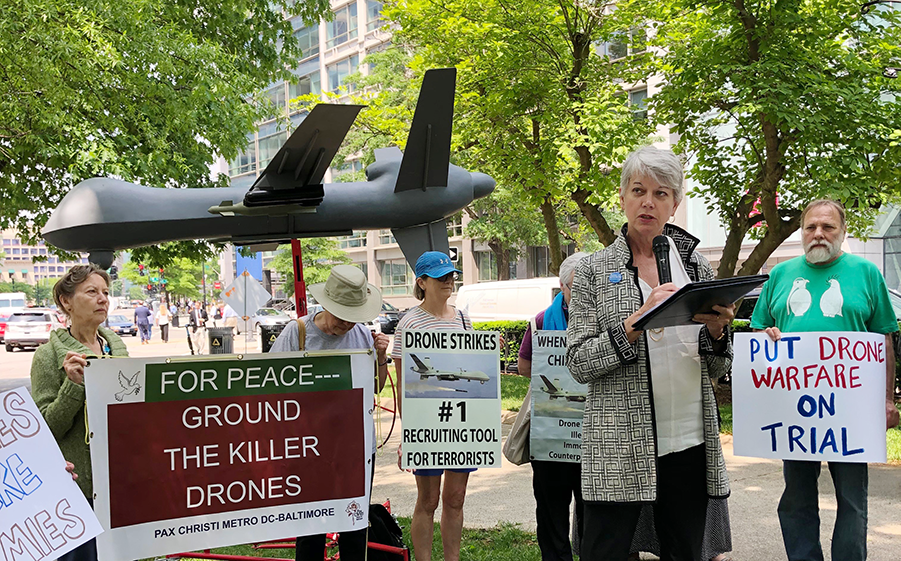
In June 2017, advocates organized a 23-hour interfaith prayer vigil outside the Capitol to oppose health care legislation pending before the Senate that, according to the Congressional Budget Office, would have caused 22 million people to lose their health insurance over the ensuing decade.
Not quite three weeks later -- and shortly before the legislation died on a vote from Sen. John McCain -- the Rev. Dr. Leslie Copeland-Tune was charged with unlawful assembly for kneeling in prayer in the Russell Senate Office Building rotunda with other African American clergy who opposed the bill. She was serving then as director of the Ecumenical Poverty Initiative.
At the police station, when a Capitol police officer reached for her hand, the ordained Baptist minister offered to pray with him. “Actually,” he said, “I just need to take your fingerprints.”
“We have this prophetic role to speak truth to power -- to embody truth, and to do it in a loving way. We try to approach people in love, even if we have different perspectives on an issue,” said Copeland-Tune, who is now the chief operating officer of the National Council of Churches. “But there are times when I’ve felt my insides on fire.”
Informing and educating lawmakers
Contrary to the partisan messages dominant in the Twitterverse, lawmakers aren’t bad or evil, Copeland-Tune said, but they are sometimes ill informed.
There was the former congresswoman from Tennessee who told Copeland-Tune she’d learned from the manager of a public housing project in her district that residents stayed there for generations because they loved it so much -- not because they couldn’t afford to leave.
Or the Texas congressman who insisted that payday lenders had to charge upwards of 300% interest because borrowers routinely took out $500 loans and then disappeared across the border, failing to pay them back.
Copeland-Tune said she and other clergy members often have direct contact with the people who most suffer at the hands of legislation based on faulty stereotypes, and it’s their job to lift up those stories to help educate lawmakers.
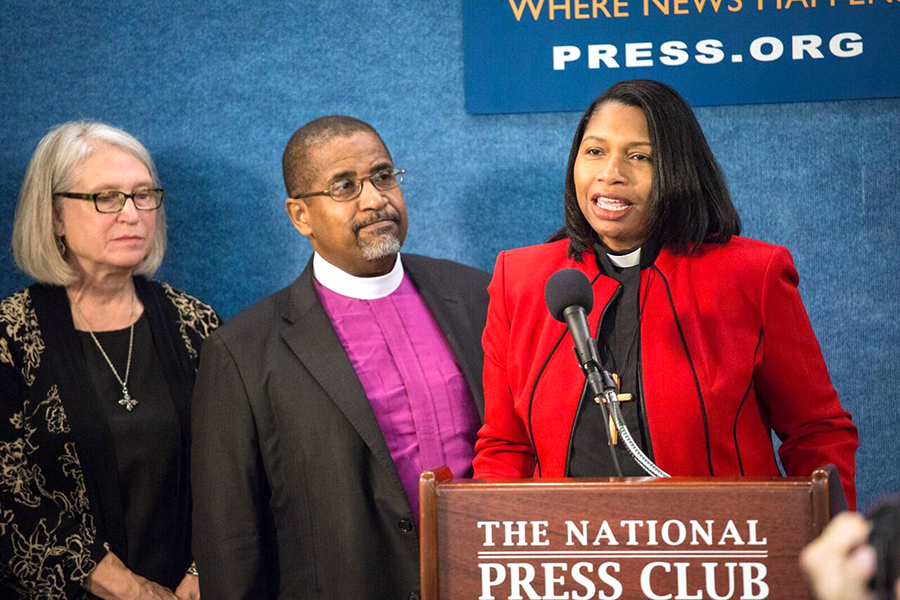
“Our role is to help give them information, to disband false narratives they have when they really are trying to serve people,” she said. “We are the ones people are coming to in these vulnerable moments, when they don’t have health care or can’t feed their children, and we’ve got to be able to say, ‘No, this policy will have a huge negative impact on the people who are “the least of these.”’
“What we try to do is peel back the layers, frame it in a way that, regardless of where you’re coming from, you receive it not as partisan but, ‘This is a moral issue we want you to be aware of.’”
Sometimes, Kegan said, presenting information in the context of faith can give “cover” language to lawmakers who are trying to explain their decisions to party loyalists. Additionally, she said, it’s not unusual for faith-based advocates to start their gatherings with legislators in prayer or to end them by asking whether staffers have any prayer requests. For harried folks on the Hill buffeted by competing interests, that can help set a quiet, reflective tone, she said.
“I love working in this interfaith space. I’m encouraged to wear my faith on my sleeve,” said Kegan, who is Presbyterian. “There’s so much anger out there, but the faith community is in a strong place to be able to step into that space and say, ‘We’re not going to respond in anger.’”
It’s difficult not to get strident when you feel that an urgent need isn’t being recognized, Campbell said. But it’s important to “hold a heart” for staffers and lawmakers, she said, and more effective over the long term to forge relationships built on civil discourse and mutual respect.
With whom do you need to check your anger and frustration and instead “hold a heart”? How might your prayers for those individuals or groups be framed to help build long-term, mutually respectful relationships -- no matter who is elected?
“My faith, for me, is about deep listening, listening to the Spirit, the needs of our times, listening for solutions we might not think of otherwise, being willing to risk and try something new based on what we hear,” she said. “It’s really about wrestling with issues and finding the best way forward.”
Faith-based advocates note that this is a particularly challenging time to work in the nation’s capital, amid record levels of rancor and an unprecedented pandemic. But success is measured in progress over the long term, Kegan said, noting that the stated goal of the Friends Committee on National Legislation is to end poverty, hunger and war.
“That’s not a tomorrow-we’re-gonna-get-there issue. That long-term commitment takes a lot of faith,” she said. “And our faith is not a faith of despair. It’s one of hope. Especially in these times, it’s important to lean on that.”
Questions to consider
Questions to consider
- What are your top priorities in “taking care of [your] people”? What is the “place of passion” from which you and your church or organization can speak with your representatives on these issues?
- If you are already engaged in advocacy, how might you think about Shoshana Abrams’ advice to be both persistent and kind in these efforts?
- With whom do you typically disagree on advocacy issues? How might you come together and find the places where you do agree, in order to strengthen your work for “the least of these”?
- What is the “common moral language” you can use to lift up the core tenets of your faith, such as “feeding the hungry, clothing the naked, loving the neighbor, caring for the Earth, promoting peace”?
- With whom do you need to check your anger and frustration and instead “hold a heart”? How might your prayers for those individuals or groups be framed to help build long-term, mutually respectful relationships -- no matter who is elected?

